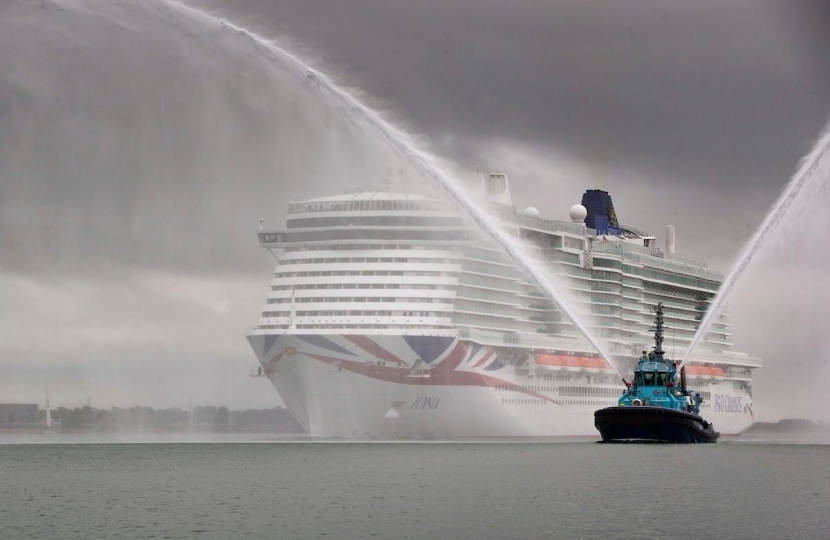
Nusrat Ghani, MP for Wealden, shares some thoughts on what the Government can do to ensure we are part of the cruise sector's emerging recovery story.
Few industries have been as impacted by the global Covid-19 pandemic as the cruise sector. One of the first to be hit by lockdowns and tightening rules on travel, cruise companies have weathered a painful 18 months. However, the sector has emerged with some of the most innovative and enhanced health protocols worldwide. So why is it is still facing Governmental resistance and pushback? As a former Maritime Minister and now Trustee of the Seafarers’ Charity, I’ve heard points raised by both sides over the last year and I can understand the Government’s concerns over Covid-19 and spreading the virus. But it’s simple - cruising really is the safest form of transport, it provides an economic and cultural lifeline for hundreds of thousands of people, and it needs to be heard.
It is worth recapping the sheer economic scale and impact of the cruise sector in this country. According to Cruise Lines International Association (CLIA) data, the sector brings in over £10 billion a year to the national economy and supports over 88,000 jobs. Here in Britain, we employ a fifth of all the sector’s 435,000 employees in Europe. And like the maritime industry as a whole, cruise ships play a vital role as an economic lifeline for many coastal communities that form the backbone of our Prime Minister’s Levelling Up agenda, a point I’ve argued for previously in a report for Policy Exchange.
Then there’s the economic case from having boatloads of tourists arrive or embarking in your town and port. CLIA estimates that passengers spend an average of £70 in each port they visit, and £160 in the port they embark from. This totals up to around £491million when last measured in 2018. Again, it’s worth emphasising that this is direct investment into communities well beyond the M25. Each of the 800 or so cruises that begin in Scotland generate an average of around £104,000 for the local economy. Belfast Port typically sees generation of £110,000 per cruise, and Liverpool Cruise Terminal, with over 100 cruise ships on an average year, sees £14 million generated. This money is going into cafes, bookshops, restaurants, museums, and galleries – all of which are crying out for a bit of financial love right now.
Let’s look beyond the clear economic argument for supporting the cruise sector, and instead focus on the cultural opportunities it brings. Prior to the pandemic, cruise ships helped ferry hundreds of thousands of people from around the world to the coast of our magnificent isles. For many of them, this may well have been their first interaction with the United Kingdom. They may have stopped in Southampton, taking in the old city walls or visiting the SeaCity Museum. Perhaps they visited Leith in Scotland, or saw the white cliffs of Dover. And they likely will have alighted at Portsmouth, visiting Spinnaker Tower or learning about Britain’s naval history.
Each of these visits and locations provides a snapshot of our culture – a chance to show the best of British to a new audience every week. And what better way to champion our Global Britain vision than by parading it on our own shores?
It is understandable that the Government may have reservations about the cruise sector and its role in spreading Covid. However, the fact of the matter is that no other industry has developed health protocols that go as far as cruising. This was, after all, the first industry to commit to 100% testing for passengers and crew worldwide.
There’s a couple of things that can be done. First, the sector is asking the Government if passengers can fill out their passenger locator forms prior to the journey, rather than leaving it until they come into port, which causes bottlenecking and strains Wi-Fi. Second, the cruise sector is strengthened by its diverse and multinational workforce. However, this means that many of them are not able to get the NHS Covid vaccination certificate. Here, the Government could offer an appropriate vaccination certificate for all seafarers, similar to what it currently does with non-UK nationals in the armed forces, and removing the bureaucratic headache and smooth lining the process.
It’s critical that the Government understands the need for it to firmly offer support to the sector. As I noted in the report for Policy Exchange, if the sector is to recover, the industry itself will need to convince potential customers that it is safe to travel on cruise ships. Government reassurance here will go a long way. The cruise sector has bent over backwards to emerge from this pandemic in a safe fashion – we must do more than help them just stay afloat.
